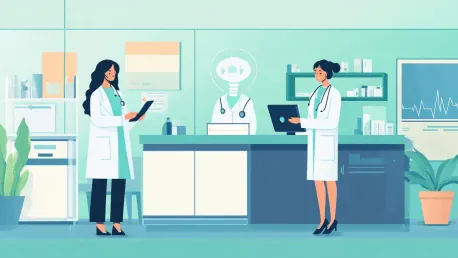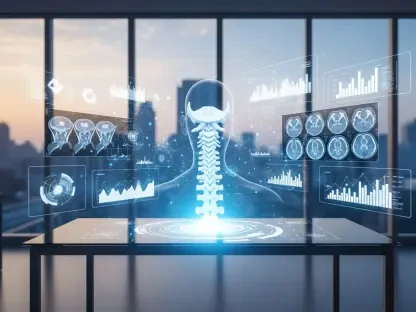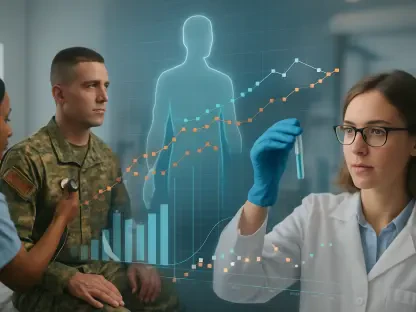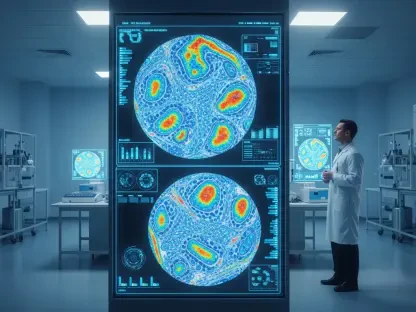The transformative potential of AI-powered self-triage tools in healthcare is becoming increasingly evident. Imagine a world where smartphones act as the frontline against illness, capable of assessing symptoms, offering personalized advice, and guiding patients to appropriate care with unprecedented efficiency. This emerging reality, driven by artificial intelligence (AI), promises to redefine how individuals access and experience medical care amid ever-growing patient needs and strained healthcare systems.
The Evolution of Patient-Provider Relationships
From Transactional to Proactive Care
Historically, the relationship between healthcare providers and patients has been transactional, primarily revolving around in-person visits and claims processing. This conventional model often fails to address the underlying issues of unnecessary healthcare utilization and escalating costs. Consequently, the healthcare industry is increasingly recognizing the importance of proactive early engagement with patients. By shifting to a model focused on preventive care and early intervention, healthcare organizations are better equipped to manage patient health outcomes while optimizing resource efficiency.
The implementation of AI-powered self-triage tools exemplifies this shift towards proactive care. These tools reduce reliance on traditional, in-person methods, fostering a dynamic interaction whereby patients are encouraged to engage with their healthcare journey actively. As AI technology evolves, it aligns with the industry’s goal of improving care coordination and navigating patients to the most appropriate care pathways at the right time. This transition from reactive to proactive healthcare enables more strategic resource utilization and paves the way for a more efficient overall healthcare system.
Enhancing Health Outcomes and Resource Efficiency
By integrating AI-powered self-triage tools, healthcare organizations aim to enhance health outcomes and resource efficiency, thereby shifting towards preventive care and early intervention. This shift fosters proactive health management, improves care coordination, guides patients to the right care at the right time, and curtails unnecessary appointments and claims. Through these advanced tools, patients can receive timely advice that prevents the exacerbation of symptoms, which often leads to more complex and costly medical treatments.
These AI-driven tools provide unprecedented levels of healthcare system relief by reducing the volume of unnecessary patient visits. Healthcare providers benefit as they can allocate their resources more effectively, prioritizing cases that genuinely require medical attention. Additionally, the data captured and analyzed through these tools provide healthcare organizations with valuable insights into patient behavior and health trends. This information can drive more informed decision-making and policy development, ultimately leading to better health outcomes and a more robust healthcare system.
Challenges in Data Collection and Patient Engagement
Barriers to Effective Data Collection
Despite recognizing the necessity of patient engagement, many healthcare organizations face challenges in obtaining actionable data essential for connecting patients with appropriate care. These challenges include limited digital engagement platforms, infrequent member interactions, and inadequate in-house medical knowledge for comprehensive health navigation. Such limitations hinder the ability to gather relevant patient data, which is crucial for effective health management.
Moreover, traditional methods of patient interaction, often protocol-based, may not provide the depth of information needed for a personalized healthcare approach. Patients may miss scheduled appointments, leading to gaps in essential health data. In some cases, the available platforms lack user-friendliness, deterring patients from actively participating in their healthcare journey. Addressing these barriers is critical to realizing the full potential of patient engagement and ensuring that comprehensive, actionable data is available for effective healthcare delivery.
AI Solutions for Enhanced Data Collection
AI-powered self-triage tools present solutions that address these challenges, significantly enhancing data collection and analysis capabilities. AI facilitates more personalized and engaging health assessments through dynamic triaging, resulting in higher completion rates and more comprehensive data compared to traditional protocol-based systems. Such tools transform patient interactions, allowing for continuous monitoring and active engagement that surpasses conventional healthcare visits.
These AI tools enrich the quality and quantity of patient data by utilizing advanced algorithms to dynamically adapt and personalize the healthcare experience based on real-time information. By analyzing user inputs and contextual data, AI tools create detailed health profiles that help identify potential ailments earlier, leading to more accurate diagnoses and appropriate care recommendations. This proactive approach ensures that patients feeling uncertain about their symptoms can receive immediate, reliable information and guidance, thus fostering improved overall health outcomes and creating a more patient-centered healthcare system.
Key Features and Benefits of AI-Powered Self-Triage
User-Friendly and Accessible Tools
AI-driven self-triage tools boast features designed to be user-friendly and encourage patient engagement. These tools offer instant, on-demand access, enabling patients to utilize them anytime, anywhere, without the need for scheduling an appointment. The ability to repeat assessments permits users to revisit their symptoms, add forgotten information, or start over if necessary. This flexibility ensures patients feel more in control of their healthcare journey, which leads to higher engagement and satisfaction rates.
AI-powered tools are also developed with intuitive interfaces that make health assessments straightforward, even for those who may not be tech-savvy. Through easily navigable platforms and clear instructions, patients can seamlessly interact with these tools to address their health concerns promptly. Furthermore, these tools empower patients to seek medical help proactively rather than reactively, promoting better health outcomes and reducing the burden on healthcare systems.
Privacy and Multilingual Support
Interestingly, many patients experience a greater sense of privacy when interacting with AI compared to human healthcare providers, leading to more open and honest symptom reporting. Moreover, multilingual support improves accessibility, allowing individuals from diverse linguistic backgrounds to use the tools effectively. These features significantly enhance inclusivity, making accurate health assessments possible across varied patient demographics, which can often be a barrier in traditional healthcare settings.
Advanced natural language processing capabilities enable AI to interpret symptoms described in everyday terms, enhancing user experience. This technology bridges the communication gap between patients and healthcare providers by accurately understanding and responding to patient inputs. As a result, patients can describe their conditions in their own words without the fear of being misinterpreted. The integration of these features ensures that AI-powered self-triage tools remain a reliable and equitable resource for people in need of medical guidance.
Detailed Explanations and Flexible Interaction
Patients can receive detailed explanations of symptoms and potential conditions at their own pace, and the flexible interaction allows users to take breaks, research information, and return to the assessment without feeling rushed. These features collectively contribute to higher patient satisfaction and engagement, leading to better health outcomes and more efficient healthcare resource utilization. Through these tools, patients gain a deeper understanding of their health, enabling them to make more informed decisions about their care.
AI-powered tools provide not just a diagnosis but comprehensive education about the patient’s health condition, possible treatments, and preventive measures. This patient-centric approach empowers individuals to take charge of their health and make proactive choices that could mitigate or prevent medical issues. By fostering an environment where patients feel confident and informed, AI self-triage tools enhance the overall healthcare experience, ultimately driving a more effective and responsive healthcare system.
Benefits for Healthcare Providers
Alleviating Healthcare System Burdens
For healthcare providers, AI-powered self-triage tools offer numerous advantages. By guiding patients to appropriate care levels, these tools help alleviate the burden on healthcare systems, reducing unnecessary visits and optimizing resource allocation. This burden alleviation allows healthcare workers to focus their expertise on cases that truly require in-depth medical intervention. It, in turn, streamlines the entire healthcare process and prevents system overload, particularly during peak times.
Moreover, AI tools help balance the workload across healthcare providers, ensuring better distribution of patients and preventing burnout among medical professionals. By accurately triaging patients and directing them to the right healthcare service, AI reduces the instances where patients might end up in the wrong department, receiving either too much or too little care. It further facilitates better healthcare outcomes and operational efficiency within healthcare institutions.
Data-Driven Insights and Cost Savings
The rich data amassed through AI-powered assessments offers valuable insights for accurate risk assessments and underwriting decisions. By analyzing extensive datasets, AI can uncover population health trends and predict future healthcare needs, allowing providers to prepare for and respond to health issues more effectively. This predictive capability can transform medical practice by enabling early interventions, tailored treatments, and comprehensive care plans.
Promoting preventive care and reducing unnecessary utilization present significant cost-saving opportunities for healthcare organizations. By preventing disease progression and minimizing severe health events, AI tools help lower the long-term healthcare costs associated with chronic illnesses and emergencies. This cost efficiency benefits healthcare providers, reduces the financial burden on patients, and makes quality healthcare more accessible and sustainable. Consequently, AI-driven tools offer a win-win scenario for both providers and patients, underpinning a healthier society and a more resilient healthcare system.
Challenges and Considerations
Customization and Integration
Despite the clear benefits, healthcare organizations face challenges in implementing AI-powered self-triage tools. The diversity across healthcare systems in different regions and within countries necessitates careful customization of AI solutions. Ensuring that these tools are adaptable to local protocols, medical guidelines, and patient demographics requires strategic planning and collaboration. Customization is crucial to ensure AI solutions deliver relevant and accurate healthcare assistance tailored to specific populations.
Ensuring patient data privacy and security is paramount, requiring transparency about data usage and robust security measures. Privacy concerns remain a significant hurdle due to the sensitive nature of health data. Implementing stringent data protection frameworks and educating users on data security can help build trust and promote wider adoption of these tools. Organizations must prioritize staying compliant with regulatory standards to safeguard patient information and maintain the integrity of AI implementations.
Building Trust and Validation
Seamless integration with existing healthcare workflows and systems is essential for successful implementation, and building trust is critical. Both patients and healthcare providers must trust the AI system’s recommendations, necessitating ongoing validation and refinement of the technology. Continuous monitoring, updates, and user feedback are crucial to maintaining accuracy and reliability. Demonstrating consistent, accurate results will help earn the confidence of users and encourage widespread adoption.
Additionally, healthcare professionals need to be trained to work collaboratively with AI tools, understanding their strengths and limitations, and enhancing their own medical decision-making processes through AI insights. AI should complement rather than replace the judgment and expertise of healthcare providers. By fostering a collaborative environment, the healthcare industry can collectively leverage AI to deliver more informed and effective patient care. Establishing rigorous validation processes and transparent communication regarding AI’s role can ensure that these technologies are integrated seamlessly and effectively into everyday medical practice.
The Future of AI in Healthcare Triage
Integration with Wearable Devices
As AI technology advances, the role of self-triage tools is anticipated to evolve. Future innovations may include integration with wearable devices and sensors for real-time health tracking and personalized recommendations. These wearables can continuously monitor key health indicators, providing instant data to AI-powered platforms that offer timely interventions. Such integration could revolutionize personal health management by allowing constant analysis and immediate feedback on one’s health status.
The incorporation of wearable technology further expands the scope of AI applications, enabling constant engagement and early detection of potential health issues. Individuals could receive customized health advice and alerts based on real-time data, even before experiencing noticeable symptoms. This approach not only empowers patients with actionable insights but also facilitates more precise and personalized healthcare solutions. The seamless interaction between wearables and AI can create a holistic health monitoring ecosystem, promoting unprecedented levels of preventive care and health maintenance.
Proactive Health Management
As trust in AI systems grows, these tools could play a larger role in routine health management, potentially reducing the need for frequent doctor visits for minor issues. Advanced AI could even predict potential health issues before symptoms emerge, ushering in an era of truly proactive healthcare. By leveraging vast amounts of data and sophisticated algorithms, AI can identify patterns and anomalies that may indicate early stages of diseases or health risks, enabling timely interventions.
This proactive health management can transform the traditional reactive approach, where medical attention is sought only after symptoms appear. AI’s predictive capability can lead to optimized health plans tailored to individual needs, emphasizing prevention and early treatment. As technology evolves, AI-driven self-triage tools could become indispensable in everyday health management, facilitating a healthier population and alleviating persistent burdens on healthcare systems. This transformation signifies a paradigm shift in healthcare, driving efficiency, accessibility, and personalization to new heights.
Conclusion
The transformative potential of AI-powered self-triage tools in healthcare is increasingly apparent. Envision a world where your smartphone becomes the first line of defense against illness. These advanced tools can evaluate symptoms, offer personalized advice, and direct patients to the appropriate care with remarkable efficiency. This emerging reality, driven by artificial intelligence (AI), promises to revolutionize how people access and experience medical care, especially in the midst of growing patient needs and overwhelmed healthcare systems.
Consider how this technology can alleviate the burden on healthcare providers by filtering out non-urgent cases, allowing medical professionals to focus on patients who truly need immediate attention. Additionally, these AI-driven systems can provide users with peace of mind by delivering accurate and timely health assessments. The integration of AI in healthcare represents a significant leap forward, offering not only practical solutions for patient care but also a more streamlined approach to managing healthcare resources in an increasingly demanding environment.









